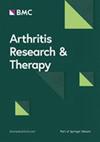Smoking as a risk factor for rheumatoid arthritis: predominant association with IgA autoantibodies – comprehensive analysis of anti-modified protein antibodies with smoking and genetic risk factors in rheumatoid arthritis
IF 4.6
2区 医学
Q1 Medicine
引用次数: 0
Abstract
Rheumatoid arthritis (RA) is an autoimmune disease characterized by the presence of autoantibodies against modified proteins, known as anti-modified protein autoantibodies (AMPAs). While the relationship between different AMPA isotypes and various risk factors remains poorly understood, investigating this association is important for a deeper understanding of RA pathophysiology. Smoking, has its primary effects in the lungs, and it remains unclear whether smoking is preferentially linked to specific AMPA isotypes, such as IgA, which could suggest a mucosal origin. Therefore, we set out to investigate the association between smoking, genetic risk factors for RA, and the presence of specific AMPA isotypes, particular IgA. In 618 RA patients, anti-citrullinated protein antibodies (ACPA-) and anti-acetylated protein antibodies (AAPA-) IgA, -IgG and -IgM and RF-IgA and -IgM were measured by ELISA. Associations with genetic risk factors, smoking and autoantibodies were assessed with logistic regression analysis. For replication, a comprehensive meta-analysis incorporating 3309 RA patients was performed. Smoking was primarily associated with IgA AMPA, with associations that prevailed after correcting for the concurrent presence of AMPA IgG (ACPA-IgA OR 1.89 [1.14–3.12], AAPA-IgA 2.30 [1.35–3.94]). To further substantiate these results, we performed a meta-analysis of 3309 RA patients and observed that smoking was again predominantly associated with the combined presence of ACPA-IgA in addition to ACPA-IgG (OR 2.05 [1.69–2.49], p < 0.001) versus the single presence of ACPA-IgG (OR 1.18 [0.97–1.44], p = 0.11). A gene-environment interaction between the most important genetic risk factor for RA (the HLA shared epitope alleles) and smoking was only seen in patients that were both ACPA-IgG and ACPA-IgA positive, but not in patients who were only positive for ACPA-IgG. These data provide a pivotal refinement of existing knowledge regarding risk factor associations for RA and lend novel support to the hypothesis that smoking may exert its effect on RA by the induction of local (auto)immune responses at mucosal sites.吸烟是类风湿关节炎的危险因素:主要与IgA自身抗体相关——类风湿关节炎中抗修饰蛋白抗体与吸烟和遗传危险因素的综合分析
类风湿性关节炎(RA)是一种自身免疫性疾病,其特征是存在针对修饰蛋白的自身抗体,称为抗修饰蛋白自身抗体(AMPAs)。虽然不同AMPA同型与各种危险因素之间的关系尚不清楚,但研究这种关联对于更深入地了解RA的病理生理非常重要。吸烟对肺部有主要影响,目前尚不清楚吸烟是否优先与特定的AMPA同型相关,如IgA,这可能表明其起源于粘膜。因此,我们着手研究吸烟、类风湿关节炎的遗传危险因素和特定AMPA同种型,特别是IgA的存在之间的关系。618例RA患者采用ELISA法检测抗瓜氨酸化蛋白抗体(ACPA-)和抗乙酰化蛋白抗体(AAPA-) IgA、- igg和- igm及RF-IgA和- igm。通过logistic回归分析评估遗传危险因素、吸烟和自身抗体的相关性。为了重复,对3309例RA患者进行了综合荟萃分析。吸烟主要与IgA AMPA相关,在校正AMPA IgG同时存在后,这种关联仍然存在(ACPA-IgA OR 1.89 [1.14-3.12], AAPA-IgA OR 2.30[1.35-3.94])。为了进一步证实这些结果,我们对3309例RA患者进行了荟萃分析,观察到吸烟与ACPA-IgA和ACPA-IgG的联合存在(OR为2.05 [1.69-2.49],p < 0.001)和ACPA-IgG的单一存在(OR为1.18 [0.97-1.44],p = 0.11)再次显著相关。RA最重要的遗传危险因素(HLA共享表位等位基因)和吸烟之间的基因-环境相互作用仅见于ACPA-IgG和ACPA-IgA阳性的患者,而不见于仅ACPA-IgG阳性的患者。这些数据为现有的RA风险因素相关知识提供了关键的改进,并为吸烟可能通过诱导粘膜部位的局部(自身)免疫反应对RA产生影响的假设提供了新的支持。
本文章由计算机程序翻译,如有差异,请以英文原文为准。
求助全文
约1分钟内获得全文
求助全文
来源期刊

Arthritis Research & Therapy
RHEUMATOLOGY-
CiteScore
8.60
自引率
2.00%
发文量
261
审稿时长
14 weeks
期刊介绍:
Established in 1999, Arthritis Research and Therapy is an international, open access, peer-reviewed journal, publishing original articles in the area of musculoskeletal research and therapy as well as, reviews, commentaries and reports. A major focus of the journal is on the immunologic processes leading to inflammation, damage and repair as they relate to autoimmune rheumatic and musculoskeletal conditions, and which inform the translation of this knowledge into advances in clinical care. Original basic, translational and clinical research is considered for publication along with results of early and late phase therapeutic trials, especially as they pertain to the underpinning science that informs clinical observations in interventional studies.
 求助内容:
求助内容: 应助结果提醒方式:
应助结果提醒方式:


